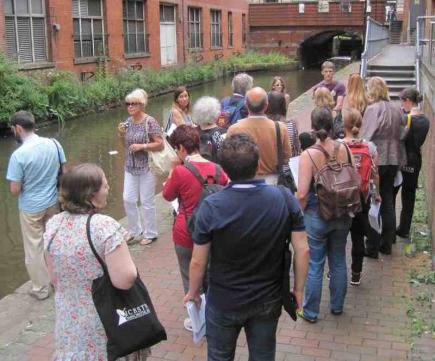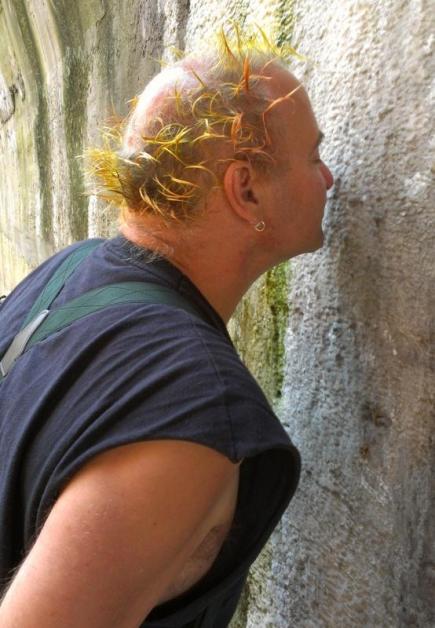There is a whiff of change in the wonderful world of smells and Manchester is at the very heart of it.
Sat in an Oxford Road café with a huge bag stuffed full of seemingly never-ending containers holding different odours ahead of her latest ‘smell walk’, Dr Victoria Henshaw resembles something of a modern-day Mary Poppins.
And like Julie Andrews’ famous nanny, the former University of Salford PhD student is on a mission to educate.
However rather than focusing on spoonfuls of sugar Dr Henshaw is looking at fine-tuning society’s ‘undervalued’ sense of smell.
She now travels the world conducting ‘smell walks’, which sees her leading a groups around a variety of urban areas to rediscover the scents that people regularly overlook.
However the aroma enthusiast, who is a lecturer in Planning and Urban Design at the University of Sheffield, always returns to Manchester to spread the word.
“I’ve done a lot of smell walks in Manchester and one of the reasons I like doing it here is that there so many varied environments,” she explained.
“We’ve got places like Oxford Road where there is a lot of traffic and pollution knocking around but there are also places like Chinatown.
“I call places like that a ‘smellmark’ (like a landmark). You could blindfold someone and they would know they were in Chinatown.”

EAU DE CANAL: Intrepid smell walkers breathe in the waterway smells
Dr Henshaw spent last month in Canada, as shown on her blog Smell and the City, this was one of a number of trips which have seen her sniff her way all over the globe.
From New York to Seattle to Barcelona and Grasse, the perfume production centre of the world, has led countless groups around a variety of cities by the nose.
While in Canada she was able to sample the delights of Chinatown areas in Toronto and Vancouver, casting a new light on one of Manchester’s most recognisable odours.
“People see Chinatown as a very positive contributor to the city.
“They see it as a very authentic representation of the Chinese community. These are not just smells that are put there to there to please us.
“But some international areas in other cities are perceived more negatively.”
Manchester’s premier international area, the second largest Chinatown in the United Kingdom, is a key attraction for Dr Henshaw but it is not the only aroma that piques her interest in the city.
“You also have the canal. One of the things about Manchester city centre is that there are very few areas of green space compared to other cities.
“Green space provides a respite from the stresses of living and working in a city.
“What I’ve found in Manchester is that people will go there on their lunch break to sit down or walk next to the canal and I’ve explored the part smells play in that.
“Smell really does contribute to that feeling of relaxation.”
These walks are a unique way of experiencing a city from a fresh perspective and she believes that society does not give smell the sense of importance that it deserves.
“I do the smell walks because I want to do research on what people are detecting in cities and they can start to think about how smell impacts their lives.
That is if people think of smell at all.
Dr Henshaw, who is author of Urban Smellscapes: Understanding and Designing City Smell Environments, seemed bemused that smell is often forgotten, especially in her role as an urban designer where sight is often the all-conquering sense.
Smell walks can be seen as an antidote to this way of thinking, and the supreme sniffer is looking to fight back.
“People can be liberated and can throw off the shackles of not smelling things,” she said.
“When we are young, we are told ‘don’t do that’ and ‘get your head away from that, it’s going to make you ill’.
“But I’ll go and smell a wall and sometimes people will be a bit reserved and think it’s a bit weird.

BREATHE IT IN! One smell walker takes a whiff of a wall
“In Manchester, people will get really into it and really start smelling things, especially kids – they just love it.”
The increase in popularity of Victoria’s smell walks, which often attract 30 people, is really started to develop with last week’s walk reeling in a bumper crowd of 50 eager noses.
Last week’s week walk coincided with a talk discussing Sense which Dr Henshaw delivered as part of Manchester Metropolitan University’s 4x4Manchester programme.
“It’s a really exciting time in the smell world,” smiled Victoria.
“Smell technology is coming on leaps and bounds at the moment.
“In the next 20 years, smell technology is going to be massive and it’s all spilling into the streets.”
Dr Henshaw cites advertising campaigns which pipe aromas at bus stops in the Northern Quarter.
Commuters experienced smells from the likes of bakery chain Greggs to Mr Kipling cakes and McCains’ Jacket Potatoes in 2012.
But it’s not just weary travellers who get a whiff of comforting foody smells, with smell cartridges now available to plug into a laptop or phone to release a specific smell as an alarm or ringtone.
“You can release the smell of coffee, for example, to wake you up in the morning,” she said.
”For gaming, you can use it to release the smell of bullets or war.”
The brave new world of smell technology has even seen smells used to improve the sense of immersion of theme park rides.
Thorpe Park famously requested ‘Britain’s smelliest urine’ in a competition to create an immersive odour for their ride based on Lionsgate’s Saw films back in 2010.
The idea of using smells to create more immersion is not a new one, but cutting-edge technology means that the modern attempts at incorporating smell into entertainment have moved on from the primitive efforts of the past.
“They tried Smell-o-vision in the 1950s but in the end you would just be left with a mix of smells. You need a good ventilation system to make it work,” she explained.
“The smell design world is very reliant on the tech available at the time.”
Wherever technological advancements go in the future, Dr Henshaw is likely to be at the forefront of the field after almost stumbling into it while studying for her PhD in at the University of Salford in 2008.
“I could do any research on 24-hour cities and I found I was working with lots of people who were using sound and that got me thinking about smell,” she recalled.
After she finished her study into the role of smell in designing cities in 2011, she led a study at the University of Manchester on ‘Smell and the City’.
She continues to work in the city with specialists in different areas who are researching smell and is currently liaising with zoology professors in Manchester on the role of smell in marketing in her latest venture.
“When I first started this research I had no idea where it was going to take me and all these things I start finding out and thinking ‘God, this is amazing’,” she added enthusiastically.
“The more I find out about smells the more there is fascinating about them.
“I think we can create much richer environments for everybody. We build these buildings that look great but I think we can forget that we’re human beings and need to feel as well.”
Dr Henshaw is set to return to Manchester on May 19 for Manchester Met’s Sensing Place Symposium.
Pictures courtesy of Vladimir Jankovic, with thanks



